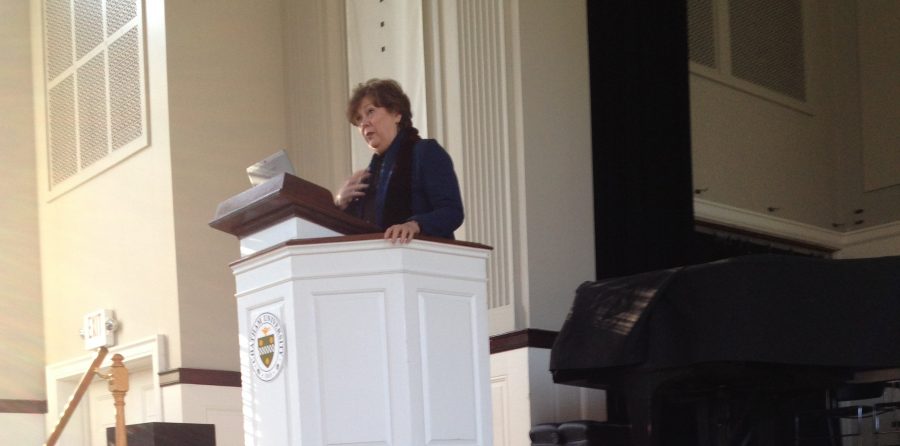At 4 p.m., Tuesday, February 18, a campus-wide meeting was called for students and faculty. Very little details were given prior to the meeting, but students speculated it would be about the rising tuition. They would be in for a surprise.
Officially the meeting was a “community campus update.” It was broken down into three sections, first the progress of Eden Hall, second the tuition raise, and last the prospect of going coeducational.
The first two parts of the meeting were expected, however the third part was not. Even the Chatham Student Government was caught off-guard by the proposition to go coeducational.
While the enrollment overall at Chatham has been increasing, the enrollment in Chatham College for Women has stayed stagnant. In 1992, when Chatham first considered going coeducational, the enrollment was 518. Today the enrollment is 542. While there is slight growth, it is not enough to keep the Women’s College viable. Growth in the future is also looking pessimistic. The first year class of 2013 is almost 50 percent less than the first year class of 2008.
Polls of female high schools seniors have shown that “only two percent would consider enrolling in a women’s college.” This puts Chatham in a niche market. With the economic downturn, college enrollment, especially in single-sex institutions has decreased significantly.
Some students believe that going coeducational is not the solution to Chatham’s enrollment problem. “One of the main reasons I decided on Chatham was because it is a woman’s college. If Chatham goes coed it will be going against a main component the university stands for. I think many women who can transfer out will,” junior Katie Roman said. “I think if we’re coed there won’t be as much focus on women’s education and empowerment.”
Chatham has made all the efforts it can to market towards female students. It has spent $4.5 million on advertising for the College for Women, which doubles the amount spent on any of the other Chatham colleges.
2015 is the proposed year for Chatham’s transition. In 2014, there will be male undergraduate students at Chatham with the introduction of the Falk School of Sustainability. Questions on where to house the male students in the future have yet to be answered officially, although the students next fall will be housed in the Hicks Estate.
To keep the spirit of the Women’s College, Chatham proposes to start an “institute for leadership and gender equality.” Female students could still earn a certificate in leadership studies, and study issues involving women.
Alternatives to going coed were suggested. Other suggestions were to lower requirements for transfer students, cut faculty and major programs, or to close the undergraduate program altogether.
Some students understood why these changes were proposed and supported the decision if it meant saving the school. Junior Jade Lawson said, “I’ve been going to an all women’s college for three years and appreciate all that it has offered me. But after watching President Barazzone nearly break into tears after telling us the news, I knew this was one of the hardest decisions for them to make.”
“I have my opinion that I have learned more in a single sex classroom but I also see that single sex colleges are failing. I am excited to see how this works out in my last year with the coed Falk School of Sustainability and how it may play for the rest of our college,” Lawson said.
Other students were quite upset with the changes. Sophomore Kenzie Saunders said, “I think Chatham would be completely treading on every principle they’ve been trying to instill in us by going coed. It would betray every positive aspect of going to an all women’s college. The magic would be gone.”
Three of the Board of Trustees members were present and spoke to support the decision to go coeducational. All three of these board members were male; aside from Dr. Barazzone no female board members spoke at the meeting.
Some students are looking at the positives of having an integrated undergrad. Sophomore Marie Soukup said, “I feel that even though we are a traditionally all women’s college, we as women will still be able to lead in the classroom and it shouldn’t effect how we learn and grow as students. I think it will be good for us to apply what we have learned about being leaders and world ready women.”
While the news about going coeducational was shocking and seemed to be the focus of the meeting, the status of Eden Hall and the rising tuition should not be overlooked.
This year phase 1A of Eden Hall was completed. Dr. Barazzone announced that this phase cost the school $17.7 million. This phase included finishing a public venue for gatherings, and creating a field lab.
Next year phase 1B will start. This phase will be focused on preparing the campus to be used by the School of Sustainability. The living facilities will be prepared to house 250 students. This phase will cost $27.7 million. When all is completed the campus should boast a 70 percent energy reduction and a 100 percent sustainability rate.
It was also announced that the tuition for 2013-2014 will be raised by 3 percent. Dr. Barazzone did note the petition effort by Chatham Student Government to stop the raise, and acknowledged that students are struggling to afford college. Despite this she stressed that a one-time increase will prevent a loss of funding, and that colleges similar to Chatham have increased their tuition by a greater amount. Also, the tuition raise will prevent Chatham from making cuts to faculty and programs.
While it is clear Chatham is considering some drastic changes to keep the undergraduate program alive, until Tuesday, the undergraduate students have been kept in the dark.







